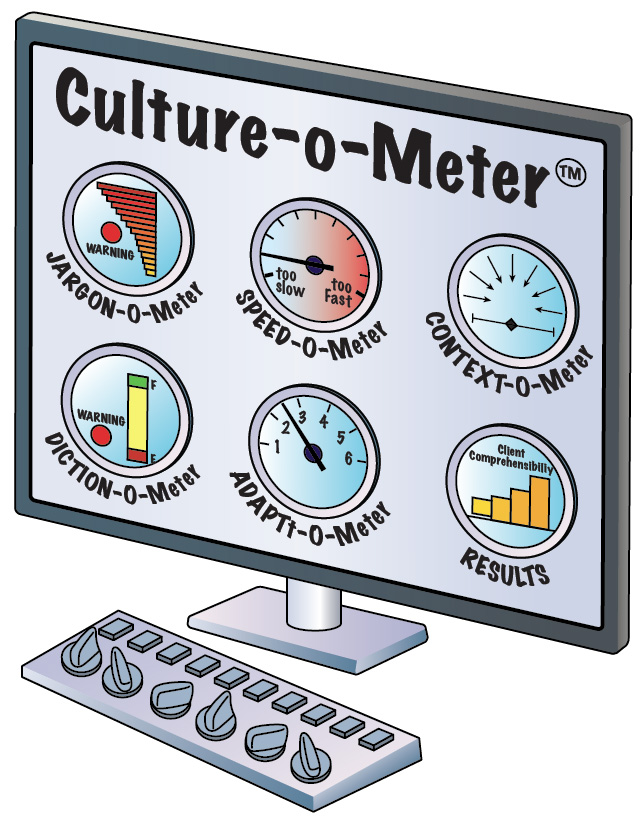
Some years ago, I created Dr Culture as a graphic story to illustrate how we can be blind-sighted to the ways we exclude others – and ourselves – from important relationships and opportunities – just by the way we speak. To cure this ill, Dr Culture uses his patented Culture-o-Meter to measure how likely we are to exclude others when we speak.
Recently, I’ve been thinking that Dr Culture needs another call when it comes to removing barriers to advancing women and people of color.
At the time Dr Culture was conceived, I was working with global business teams that were just not gelling. One of the key problems was team member’s lack of cross-cultural intelligence – including communicating across difference. Team after executive team revealed how native English speakers and non-native English speakers were missing each other. And native English speakers were largely responsible for the breakdown. Because English is the dominant language of international business, native English speakers felt free to speak too fast, use familiar regional slang and jargon, or spit out unfamiliar acronyms at a clip. A lot was lost – important information, important relationships, important opportunities.
As one global senior executive told his regional executive team, “If we can improve our ability to communicate with others outside our circle of familiarity- our culture – by just 5% the savings in time wasted in frustration, misunderstanding, withheld information, and disrupted relations would be exponential.”
“Culture” includes way more than language. Culture is revealed by the unspoken rules about how to succeed and fail within any company or community. Being among the dominant group – like the native English speakers of multi-lingual global teams – knowing these unspoken rules is power.
Ask the women and people of color “in the pipeline” and “on hold” at the rim of executive status about their experience and the company culture. Ask specifically, “What are the unspoken rules about how to succeed and fail in this organization?” Listen. Their answers are important.
Dominant Culture Blind Side & the Secret Handshake

Dr. Culture reveals that the dominant or in-power group members are prone to violate the “rules” of being understood. They have the freedom to overtalk, interrupt, speak at a fast pace, and use insider language with impunity. I call this the “secret handshake”.
This is a predictable dynamic of the dominant culture in any group.
Here’s the rub: members of the dominant group are less likely to notice this dynamic than people in subordinate groups. They have a blind side.
Read this again: members of the dominant group are less likely to notice when they are excluding people of non-dominant groups. So, these “others” – women and people of color you say you want to advance — are not the blind ones.
This is easy to spot and talk about when talking about native language. Not so easy to spot when you are talking about power. Status. Access. Inclusion.
Now, when we say we really want to hire and advance women and people of color, yes, we do have to look to how bias is woven into company policies and procedures. But culture must be examined too. Culture is at play in our language, our rituals, our rules about how to succeed and fail. It’s more than the values stated on our company website.
Check out what this executive said when he met Dr Culture and hooked himself up to the Culture-o-meter. He learned how he unwittingly excluded the very people he wanted to advance:
“Until just recently I used to let my guard down every time we broke for coffee or drinks after a long day. As soon as I moved into informal off-line gatherings, I’d lapse back into my comfort topics, familiar slang and fast pace. Before I knew it, I’d be surrounded by others I’ve known for years and who look like and talk just like me. I realized in hindsight I literally lost years of networking and building relationships outside my circle that I paid for later. I missed out on information shared in informal conversations and some of the give-and-take exchanges of small favors.”
If you are in a position of power or in the majority in your organization, ask yourself “How am I unconsciously communicating in a way that excludes others or puts up roadblocks that hinder others’ advancement?”
Wouldn’t it be nice if Dr Culture’s Culture-o-Meter dashboard gave us a jolt each time our word choice or rate of speech or appreciation of another’s culture excluded the very person we want to encourage and advance?
